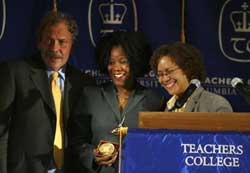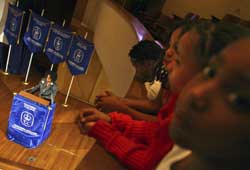Teachers College Honors Desegregation Groundbreaker Ruby Bridges Hall
From seniors to elementary school children, an appreciative homecoming crowd filled Horace Mann auditorium to honor civil rights pioneer Ruby Bridges Hall, a recipient of the Teachers College Medal for Distinguished Service.
Both President Arthur Levine and Vice President for Academic Affairs and Dean Darlyne Bailey were on hand April 1st to honor Bridges, who, in 1960, at age 6, made history as the first child to integrate New Orleans' all-white William Frantz Elementary School.
In his introductory remarks, Levine praised the proactive role Teachers College has played in offering opportunity to African-American students. Today, the College-which began accepting students of color in the 19th Century-is second in the nation in the number of doctorates awarded to African Americans,
he said.
Levine introduced Bridges as a living "symbol of change," who, as a young child, bravely handled a situation he "couldn't imagine facing as an adult."
Bailey commended Bridges' courage. "Your brave mission shed light on a situation that needed to be rectified," she said. "Through your unfaltering persistence, you made the statement ?We Shall Overcome' a reality. Your experience that year as a first grade student in New Orleans helped this country forge ahead in the battle for school integration."
Responding to a standing ovation, Bridges expressed appreciation to Teachers College for its faith in her mission. "Thank you so much for helping me with my work across the country," said the honoree, who continues to fight racism through Ruby's Bridges, the foundation she created in 1999.
Bridges read a moving passage from the writings of Frederick Douglas-a piece describing the powerful impact a mistress had on the life of a slave she taught to read.
She then praised the commitment of her first grade teacher Mrs. Barbara Henry, with whom she shared a lonely classroom for a year. "She lived Dr. King's lesson," Bridges said. "She showed me her heart."
BROWN STRONG BUT SLIGHTLY TARNISHED ON GOLDEN ANNIVERSARY
The medal presentation was preceded by a showcase featuring research, projects and initiatives from teachers and students alike.
After Bridges accepted her medal, members of a roundtable, moderated by Peabody award-winning commentator and TC Trustee John Merrow, discussed the aftermath of Brown v. Board of Education on its 50th anniversary.
Panelists were Edmund Gordon, Director of the Institute of Urban and Minority Education at Teachers College; Amy Stuart Wells, Professor of Educational Policy at Teachers College; and Sybil Hampton, President of the Winthrop Rockefeller Foundation, in Little Rock, Arkansas.
Hampton described her unique experience as the only African-American student to enter the 10th grade at Little Rock High School in 1959.
Arkansas' capital was so reluctant to integrate, it actually closed many of its schools down in 1958 to "prepare" for integration, Hampton said. However, unlike the evening's honoree Ruby Bridges, Hampton didn't experience angry mobs or other obvious hostility. "There was no harassment. I spent three years in class and no one spoke to me at all," she remembered.
Though the faculty clearly didn't want her in their school, they never denied her an education, Hampton emphasized. "I was bright and teachers responded to that. Doing well propelled me forward."
Wells discussed the findings of her recently completed study of adults who attended integrated schools in the 1970s (see related story on page 3). It concluded that a majority of survey participants valued their integrated educational experience, but found their lives becoming increasingly monochrome as they moved on to college, careers and suburbia. "As adults their lives became segregated," she said. "There wasn't a simultaneous effort to create desegregated neighborhoods and work environments."
Gordon, who had completed his education at Teachers College by the time of the Brown decision, offered a reflective overview of the past 50 years.
"We haven't equalized education across race lines. We don't have equal achievement, because we don't have equal opportunity," Gordon said, adding that "Poor white people are doing almost as poorly as poor black people."
"Certainly we've come a long way, but we've got a long, long way to go," he concluded.
Published Wednesday, Jan. 5, 2005

